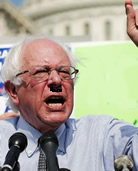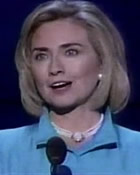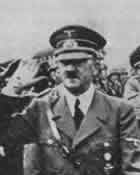Bernie, Hillary, Donald and Adolf
May 14, 2016
by William P. Meyers
Also sponsored by Earth Pendant at PeacefulJewelry
Popular pages:
| U.S. War Against Asia |
| Fascism |
| Barack Obama |
| Democratic Party |
| Republican Party |
| Natural Liberation |
Is the 2016 American Presidential Campaign the End of Democracy?
When asked why he got into politics, Senator Bernie Sanders of Vermont once offered:
"A guy named Adolf Hitler won an election in 1932. He won an election, and 50 million people died as a result of that election in World War II, including 6 million Jews. So what I learned as a little kid is that politics is, in fact, very important."
This quotation reflects the common American misunderstanding that Hitler was elected to power. He was not. He was appointed to power. Before Hitler there were several other German Chancellors, starting the Heinrich Bruning, who ruled by decree, even though elections continued. The Reichstag (equivalent of our Congress) had continued to meet, but had ceased to govern.
 |
 |
 |
 |
Democrats have accused Republican Party presidential candidate Donald Trump of being a fascist or proto-Hitler. These accusations are not entirely without basis, but mainly rely on a lack of understanding of Fascism in general (Mussolini in Italy, General Franco in Spain, and many others) and the rise of the Nazi Party to power in Germany, in particular.
How and why did Hitler come to power? The best book I have read on that subject is Henry Ashby Turner's German Big Business and the Rise of Hitler. But that is a thick, academic book that few voters will read in this era of Politics by Zinger. And this blog format is far too short to convey an adequate understanding of a complex subject, though I will supplement it with later entries. Here I will try to give an covering the most salient points.
There were many factors in Hitler coming to power, but the main one was that the older power factions were losing their grip. The capitalist Depression that hit in 1930 was a major factor, but Germany had a sad economy in the 1920s, too, because the British Empire and French Empire, and even the Dutch Empire, were sucking out its economic lifeblood in the form of war reparation payments.
Rule by decree, without the Reichstag, was a major, and probably decisive factor. We've seen this trend accelerating in America, and President Obama has set some particularly bad precedents of late. With a Congress that has become increasingly dysfunctional because it has no Middle, pushing the boundaries of the Executive Order became commonplace even before Obama. It has set up a situation where any President of any party might assume virtually dictatorial powers with a little help from supporters in Congress and the Supreme Court.
The German National Socialist Workers Party, or Nazis, did do particularly well in the 1930 Reichstag election. As with most groups of politicians, they told people what they wanted to hear, so candidates in a rural district might make different promises than candidates in urban areas. There were different speeches for different groups like middle-class shop owners or factory workers. But they also had a program in the Reichstag, which they were unable to pass despite winning the second largest number of delegates in the 1930 election [I quote from Turner, page 127]:
The Nazis proposed to nationalize all large banks;
to ban trading in stocks and bonds;
to outlaw impersonal transfers of stock ...
to limit interest rates to 5 percent ...
to confiscate all profits derived from the war, the revolution, or the inflation.
Which is to say, they whipped up a hatred of the banks and financiers much the way Bernie Sanders has. If anything, their proposals were far to the left of Sanders.
The reason Germany came to be ruled by decree was that the middle dried up in the Reichstag. In Germany there was a multi-party system, unlike the U.S. where the winner-takes-all system tends to maintain a two-party system. The middle has dried up in the U.S. Congress, with Republicans in particular moving far to the right, and even Democrats lacking the kind of centrists the party was known for since the days when Andrew Jackson stopped killing Indians and whipping slaves long enough to get himself elected the first Democratic Party President of the United States.
Germany, between the end of World War I and the final establishment of a dictatorship by the Nazis, had a complex political spectrum, but it can be simplified for our purposes. There were the parties of the far right, which tended to monarchism or support for the aristocracy. Big and small business tended to support a spectrum of pro-business parties not unlike our Republican Party. There were two Roman Catholic parties that had conservative social values but for practical purposes occupied the center of the spectrum. There were the Social Democrats, a Marxist party, and the far left parties dominated by the Communist Party.
The Nazis were off the spectrum. Their main point was they would Make Germany Great Again. Hence some appropriate comparisons to Donald Trump. But they were also highly disciplined. They had a private army, the SA, and to be a member you needed to pay dues. It is hard to imagine Donald's admirers paying dues or dressing up in uniforms and having fun by marching in the streets.
In the election of September 1930 the parties that supported the old idea, that whoever won an election fairly would only rule until the next election, took a beating. The party backed by Big Business, the Conservative People's Party, got only 1% of the vote and 4 seats in the Reichstag. An older right-wing party, the DNVP, lost half its following and dropped to 41 seats. Pro-democracy conservative parties combined got about 50 seats. The Catholic Parties were relatively stable, but the Socialist Party dropped from 154 to 143 seats [Reichstag 1930 complete election results].
It was the extremists who made big gains. The Communists won 77 seats from their prior 54. The Nazis won won 107 seats, up from 12. It is important to note that they were nowhere, nowhere near being a majority party. They would not win a majority in the Reichstag until after Hitler was appointed to power and could hold essentially fake elections. That would follow nearly 3 years of rule by decree by a series of Chancellors prior to Hitler's appointment.
The Center did not hold. Why? Because people are stupid, or enough people are stupid often enough, particularly during a panic, to wreck any social, political, or economic system, no matter how well designed. Like Bernie Sanders and Donald Trump, the Nazis simply made better promises than their political rivals. The gullible believed.
The Nationalism of the Nazis appealed to Germans of all classes. The Social Democrats and Communists were internationalists who argued that class trumped ethnic considerations. The Catholic Parties also had a transnational allegiance. By promising workers that they would get the goods promised by the Social Democrats and Communists, and be part of a Great Nation again, the Nazis gained many working class votes. For the lower middle class shopkeepers (this was during an era when these shopkeepers were threatened by chains of department stores) the promise of a restored nation and favoring small over big business had the same appeal as that wing of our Republican Party. One important play of the Nazis was portraying Hitler as the moderate Nazi who was keeping the radical wings of the party under control. Thus Hitler set himself up as the only person who could rescue Germany from Communism.
The Nazis did even better in the Reichstag election of 1932, but still lacked a majority. Adolf Hitler was eventually appointed to power in 1933, by President Paul von Hindenberg (who was supposed to have mainly ceremonial powers during his 10 year-terms), backed by the Pope (and hence the Catholic political parties) and the military, and with permission, but no enthusiasm, of some powerful businessmen. Adolf Hitler was considered the lesser of two evils. The greater evil was atheist communism as represented by the Soviet Union and the German Communist Party.
So the question I would pose to my fellow Americans is: do you really want to risk the center collapsing here, after over 200 years of rule by an elected Congress? What do you think you would get out of that?
I think the one thing we should agree on is that the President should execute the laws exactly as passed by Congress. As bad as Congress might seem at times, either because it does nothing or because it does something you don't like, it is a better system over the long run than letting one person make law by decree. Liberals may like President Obama's executive decrees, but they set a very, very dangerous precedent.
